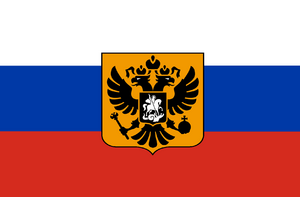New Russian Imperium (NRI)

| Government Form | Absolute Monarchy |
|---|---|
| Head of State | Tsarina Yekaterina Kiselev |
| Capital | Novaya Moskova |
| Demographics | Slavic Human Majority |
| Official Language | Inter-Slavic |
| Official Religion | Orthodox Christianity |
"In the Name of Peace." - Russian National Motto
Description
The New Russian Imperium is something of an enigmatic state to some, a nemesis to others, and above all, a presence to be reckoned with. Formed by the neglected peoples of Sol, and expanded well beyond its original purpose, intent, and even ideology, the NRI stands as a resolute bastion of the Pan-Slavic Identity in a galaxy that very much would like to wash it away. More than the other states of the Known Galaxy, the NRI’s main objective has been to take care of its own needs, on its own terms, and to shelter the ambitions of those who think similarly to them.
History
The Exodus
The NRI traces its roots back to the glory days of Sol’s pioneering, back when the Solarian State was the independent Solarian Federation. In those times, the Solarian government had come to largely neglect the Slavic cultures, a result of the Western and East Asian thinking that dominated SolFed. The Slavic peoples, bound together in a common cause, took as many colony ships as they could produce, buy, or otherwise get their hands on, and took to the stars. It was agreed upon by the Slavic settlers heading out that the government of Sol had no further stake in running their lives, and as such they decided to head out as far as their ships could take them at the time. The combined group of voyages which departed would coalesce primarily around the system that would become Novaya Moskva, which would become the capital of the state formed from the associations of colonies in the region. Far from Sol, and any aliens that might otherwise sully their dream, the Slavic peoples made new lives for themselves.
The lack of foreign pressure, however, caused the disparate colonies to turn on themselves for a time. The resulting tumult left the survival-oriented colonists little time or desire to maintain records, and as such there is little to go on for quite some time.
Third Soviet Union
Eventually, as the turmoil faded, the Slavic people had truly come together, by force where necessary, into a singular political regime. The victor of those early colonial conflicts was a Communist regime, third of its name, and highly repressive as a result of the wars. The Third Soviet Union became the first true outward Pan-Slavic state, and its influence would spread in the form of new colonies, both further afield and, perhaps paradoxically, closer to Sol. Carefully planned expansionism became the policy of the day, perhaps in the hopes of one day exporting the Revolution back to Sol, but certainly to fuel the new industrial furnaces that were popping up. The establishment of these territories further from Novaya Moskva would bring the Third Soviet Union back into contact with the galaxy at large.
Over the course of about seventy years, under the surface, not everything was panning well with the regime. The arrival of the Union on the galactic stage was a mess, as the ideologically estranged state found more reasons to pursue raiding and covert action against its neighbors than straightforward diplomacy. This policy of underhanded dealing did little to actually enrich the Union, and set negative precedents both internally and externally. Although the leadership of the Union held an absolute degree of power, the raiding subculture being built led to divisive factionalism. Soon enough, the administrative regions of the Union fell under control of local strongmen and power brokers. The slipping of central power also led to the rise of the so-called “space gopnik” movement, as people began to turn to criminality driven by poverty and a lack of faith in either God, or the regime. Surely enough, the progress made by the Third Soviet Union was broken down by its gradual over-reliance on the raiding subculture. The Union would soon once again essentially only exist in name as factionalism reached its peak, and many of the Slavic people began to turn away from hardline Communism as their solution to life’s problems. They turned toward more liberal strands of government in some cases, and straight-up banditry in others.
